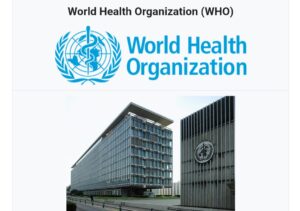
The promotion of health and welfare for all people worldwide is the mission of the World Health Organization (WHO), a global organisation. It was founded in 1948, and Geneva, Switzerland, serves as its corporate headquarters. The company employs more than 7,000 employees and conducts business in more than 150 countries.
Leading on issues of global health, establishing norms and standards, monitoring and evaluating health trends, and defining the agenda for future health research are all core goals of the WHO. The goal of the organisation is to guarantee that everyone can experience the best degree of health, regardless of their social or economic situation.
The WHO is charged with a wide range of duties, including performing health-related research and development, offering technical support to developing nations, coordinating health programmes and initiatives, and advising governments on health policy. Public health information and education are also provided by the organisation, along with the formulation and promotion of international health regulations.
The elimination of smallpox is among the WHO’s greatest accomplishments. When it first emerged, this disease posed a serious risk to public health, killing millions of people annually throughout the world. Because to a comprehensive vaccination effort that entailed cooperation between the WHO and national health authorities around the world, the WHO declared smallpox to have been eradicated internationally in 1980. This accomplishment showed the value of worldwide collaboration in tackling health issues as well as the efficacy of global health programmes.
The WHO emphasises the need to prevent and manage communicable diseases. The organisation works with governments, public health organisations, and other stakeholders to develop and implement projects that aim to reduce the occurrence of communicable diseases and their effects on public health. Also, the WHO plays a critical role in responding to global health emergencies like the COVID-19 pandemic and the West African Ebola outbreak in 2014.
The WHO also deals with non-communicable diseases like cancer, cardiovascular disease, and diabetes in addition to its work on communicable diseases. The group promotes laws and programmes that deal with issues including inequality, poverty, and difficulty accessing healthcare and education as well as other social and economic factors that affect health. The WHO wants to improve health outcomes and lessen the burden of disease globally by addressing these variables.
The WHO’s efforts to promote health as a basic human right are also very essential. The group fights to guarantee that everyone has access to healthcare, regardless of their financial status or place of residence, and it promotes laws and actions that acknowledge health as a fundamental human right. The WHO supports community and individual empowerment to take charge of their health and wellness.
A set of guiding principles direct the operations of the WHO. These values encompass a dedication to equity, accountability, transparency, and fact-based decision-making. In order to accomplish its objectives, the organisation is dedicated to collaborating with governments, civil society organisations, and other stakeholders.
The WHO’s requirement to handle the health needs of a rapidly expanding global population is one of its problems. The burden of disease is increasing along with the global population, especially in low- and middle-income nations. The WHO must keep creating and implementing efficient health policies and interventions that can meet the needs of this expanding population in terms of health.
The WHO also has to deal with the social determinants of health, which is a challenge. The group is aware that societal issues including poverty, injustice, and a lack of access to healthcare and education play a significant role in poor health outcomes. Governments, civil society organisations, and other stakeholders must work together in a multi-sectoral strategy to address these concerns.
The COVID-19 pandemic response by the WHO has brought attention to the significance of international cooperation and global health governance in tackling pressing health issues.
